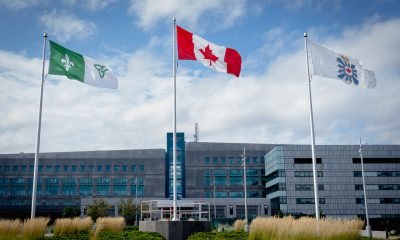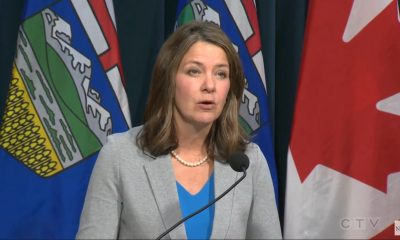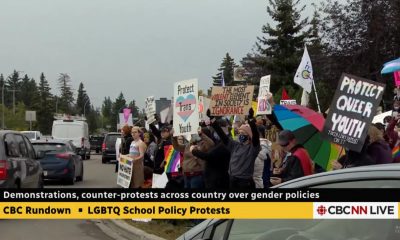Canada
Canada warns LGBTQ citizens about traveling to US
Advisory notes states have implemented anti-LGBTQ laws
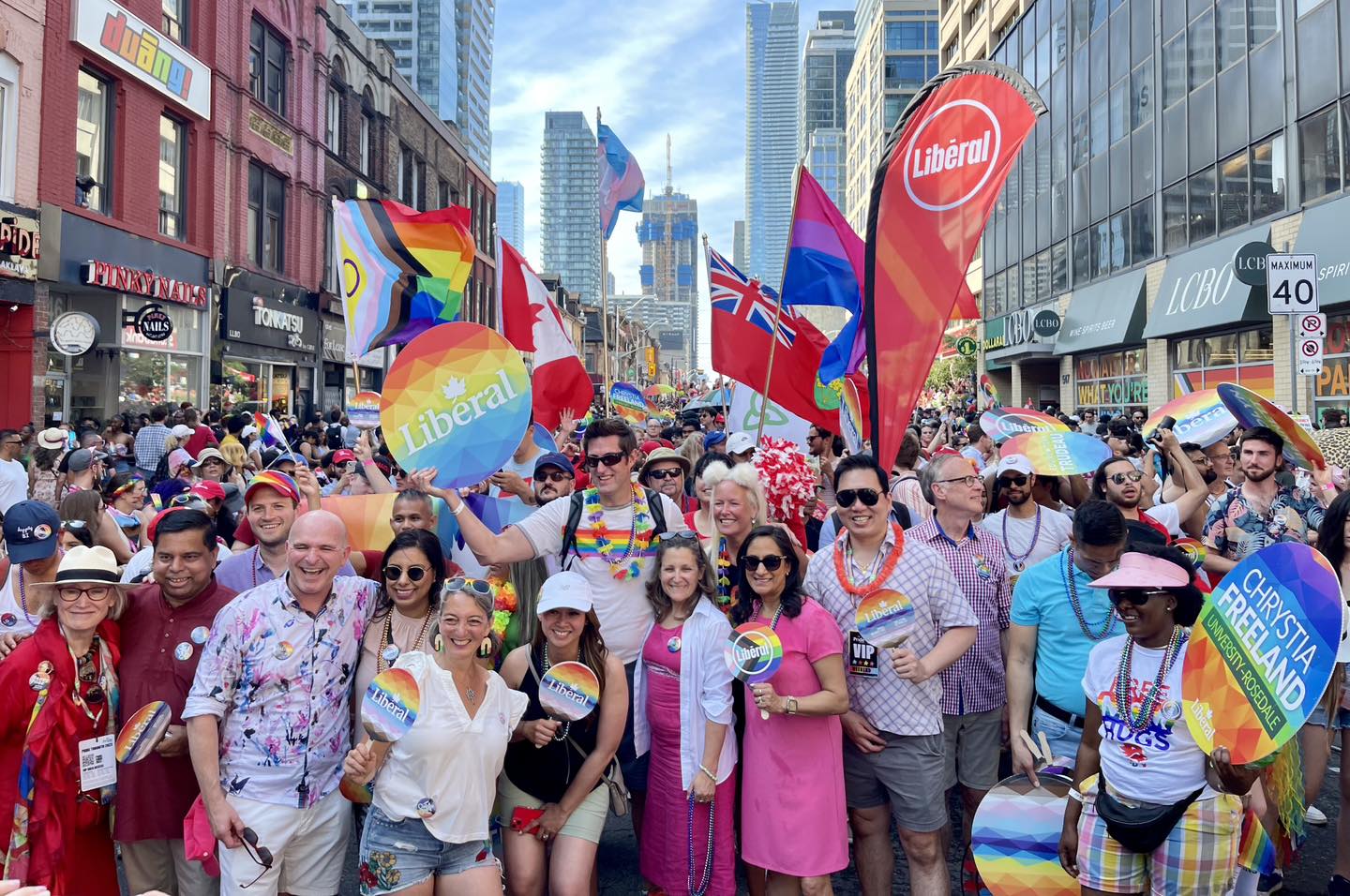
Speaking with reporters Tuesday, Deputy Canadian Prime Minister Chrystia Freeland said that Global Affairs Canada has updated its travel advisory for the U.S. for LGBTQ Canadians.
The new advisory reads “some states have enacted laws and policies that may affect 2SLGBTQI+ persons. Check relevant state and local laws,” and directs people to a web page that CBC reported provides broad information on how members of the community could be targeted while travelling to foreign countries.
That advice tells travelers to beware of laws that criminalize same-sex activities and relationships, or target people based on their sexual orientation or gender identity.
That advice also warns travelers that laws to curb vagrancy and public nuisance incidents could also be used to target them in an effort “to criminalize 2SLGBTQI+ people.”
During the press briefing Freeland said she supported the decision to update the travel advice but would not comment on whether U.S. President Joe Biden was informed before the update was made.
“Every Canadian government, very much including our government, needs to put at the center of everything we do the interests and the safety of every single Canadian, and of every single group of Canadians,” she said. “That’s what we’re doing now. That’s what we’re always going to do.”
Freeland also told reporters that as a former foreign affairs minister, she’s confident that travel advisories appearing on the Global Affairs Canada website are “done very professionally.”
“We have professionals in the government whose job is to look carefully around the world and to monitor whether there are particular dangers to particular groups of Canadians. That’s their job and it’s the right thing to do,” the deputy prime minister added.
In a media statement released by Global Affairs Canada, the department said:
“Since the beginning of 2023, certain states in the U.S. have passed laws banning drag shows and restricting the transgender community from access to gender affirming care and from participation in sporting events. The information is provided to enable travelers to make their own informed decisions regarding destinations. Outside Canada, laws and customs related to sexual orientation, gender identity, gender expression and sex characteristics can be very different from those in Canada.”
The American Civil Liberties Union is tracking 495 anti-LGBTQ bills in the U.S. for the 2023 legislative year in over half of the U.S., a majority that would impact LGBTQ Canadian travelers.
Accurate IDs
These bills attempt to limit the ability to update gender information on IDs and records, such as birth certificates and driver’s licenses. This puts transgender people at risk of losing jobs, facing harassment and other harms. Trans, intersex and nonbinary people need IDs that accurately reflect who they are to travel, apply for jobs, and enter public establishments without risk of harassment or harm.
Civil rights
These bills attempt to undermine and weaken nondiscrimination laws by allowing employers, businesses and even hospitals to turn away LGBTQ people or refuse them equal treatment.
Free speech and expression
Despite the safeguards of the First Amendment’s right to free expression, politicians are fighting to restrict how and when LGBTQ people can be themselves, limiting access to books about them and trying to ban or censor performances like drag shows.
Healthcare
These bills target access to medically-necessary health care, like Medicaid, for transgender people. Many of these bills ban affirming care for trans youth, and can create criminal penalties for providing this care. These bills exempt identical treatments offered to cisgender youth or are forced onto intersex youth. Other bills block funding to medical centers that offer gender-affirming care, or block insurance coverage of health care for transgender people.
Public accommodations
Public accommodations bills seek to prohibit transgender people from using facilities like public bathrooms and locker rooms. Everyone should have access to these spaces, no matter their gender identity or gender expression. If you can’t use the restroom, you can’t fully participate in work, school, and public life.
Schools and education
State lawmakers are trying to prevent trans students from participating in school activities like sports, force teachers to out students, and censor any in-school discussions of LGBTQ people and issues. Instead of limiting resources, education, and opportunities, our schools should protect and support all students to learn and thrive.
Other anti-LGBTQ bills
These bills don’t quite fit in any of the other categories, but nonetheless target the rights of LGBTQ people. Examples include bans on marriage and bills preempting local nondiscrimination protections.
Canada
Canadian intelligence agency: Anti-LGBTQ groups are ‘extreme threat’
CSIS issued advisory this week
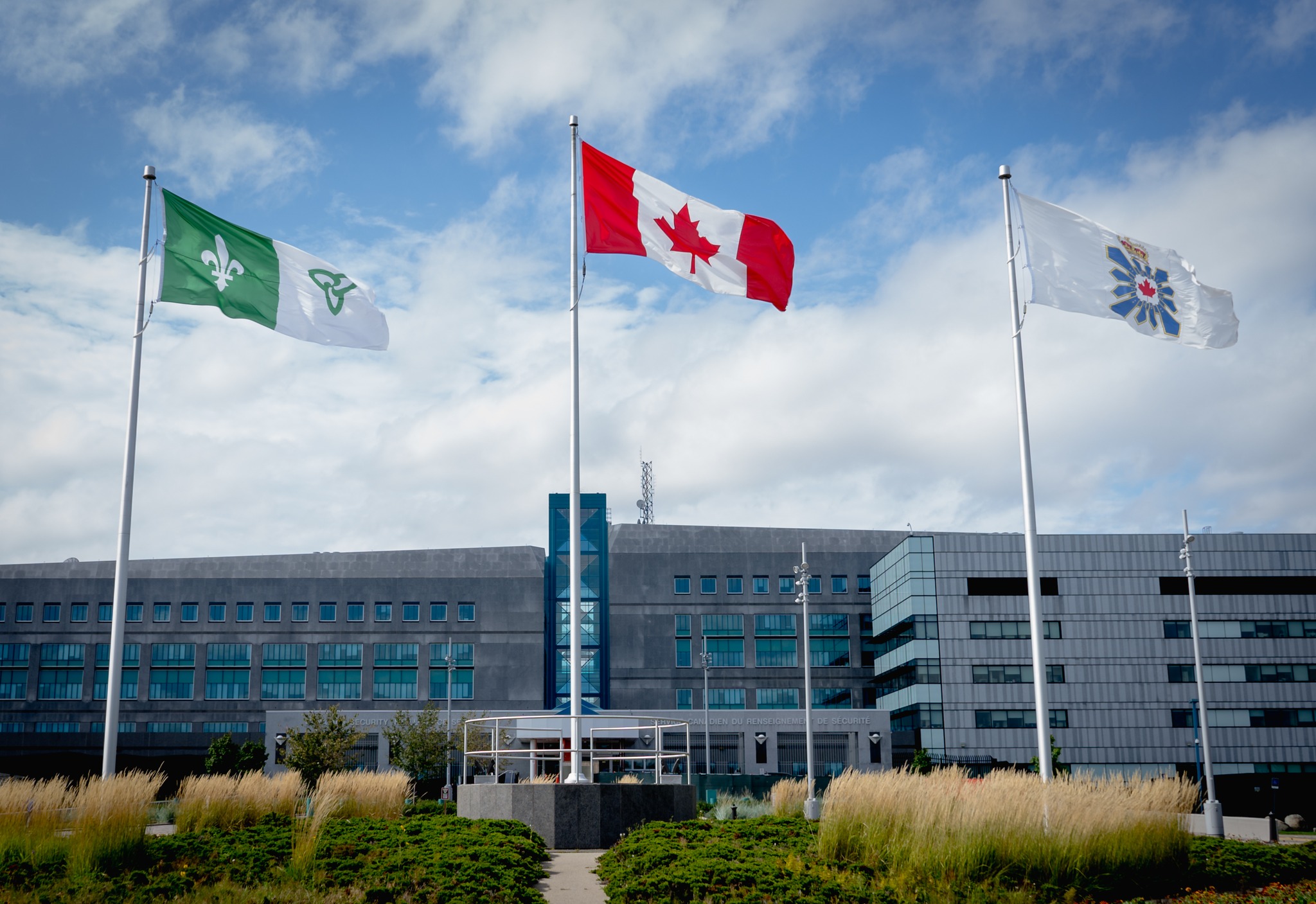
The Canadian Security and Intelligence Service is warning that anti-gender and anti-LGBTQ activists are posing a risk of “extreme violence” against the LGBTQ community in Canada, following a year of spreading organized anti-LGBTQ+ protests, anti-transgender rhetoric coming from provincial governments and an attack on a gender studies university class.
In a report obtained by the public broadcaster CBC, the CSIS Integrated Terrorism Assessment Center says it is monitoring the potential for a violent attack on Pride festivals and nightclubs across the country. The ITAC is charged with forecasting the possibility of terrorism in Canada, based on analysis of actor intent, capability and opportunity.
“Anti-LGBTQ+ narratives remain a common theme in violent rhetoric espoused by white nationalists, neo-Nazis, the Freedom Movement and networks such as Diagolon and QAnon,” the report says, according to the CBC. “Trans and drag communities in Canada have been the target of several online threats and real world intimidation tactics in recent months.”
The Washington Blade has requested a copy of the report, but it has not been made public at this time.
Last June, a knife-wielding man attacked a class on the philosophy of gender at the University of Waterloo, approximately 70 miles west of Toronto, injuring the professor and two students before he was subdued. He now faces 11 terrorism-related charges.
“CSIS assesses that the violent threat posed by the anti-gender movement is almost certain to continue over the coming year and that violent actors may be inspired by the University of Waterloo attack to carry out their own extreme violence against the LGBTQ+ community or against other targets they view as representing the gender ideology ‘agenda,’” CSIS spokesperson Eric Balsam says in an email.
Balsam says that CSIS believes the network of anti-LGBTQ and far-right communities in Canada may be a breeding ground for violent activities.
“While violent rhetoric itself does not equate or often lead to violence, the ecosystem of violent rhetoric within the anti-gender movement, compounded with other extreme worldviews, can lead to serious violence. CSIS assesses that exposure to groups and individuals espousing anti-gender extremist rhetoric could inspire and encourage serious violence against the LGBTQ+ community, or against those who are viewed as supporters of pro-gender ideology policies and events,” he says.
Last year, Pride Toronto Executive Director Sherwin Modeste told Xtra Magazine that the festival was boosting its security and increasing emergency drills to prepare for the festival in the wake of rising anti-LGBTQ rhetoric and hate crimes.
According to the latest figures from Statistics Canada, the number of police-reported hate crimes based on sexual orientation has increased in each of the last three years, from 265 incidents in 2019, to 491 in 2022, the most recent year for which statistics are available, a staggering 85 percent increase. The 2019 figure had been a record number when it was reported.
Far-right groups in Canada coalesced during the COVID-19 pandemic around protests against vaccine and mask mandates, culminating in a siege of downtown Ottawa and a blockade of border crossings that lasted for nearly a month in February 2022. It is believed that as COVID-19 receded as an animating issue, many of the networks involved transitioned to protesting LGBTQ rights and trans rights in particular.
A small but organized group of anti-LGBTQ activists have organized sustained campaigns targeting school boards, libraries, drag performances, Pride festivals and provincial legislatures to oppose LGBTQ rights and sex education in schools for the last two years. The protests are generally outnumbered by counter-protesters who support LGBTQ rights, but there have been sporadic reports of violence and arrests at the protests.
Last fall, the far-right X account Libs of TikTok, whose operator Chaya Raichik has boasted that her anti-LGBTQ “shitposts” frequently inspire violence and bomb threats, turned her attention to a school in suburban Vancouver because a teacher who is nonbinary works there.
While no violence emerged from the post, the parent who drew Riachik’s attention was given a warning by the Royal Canadian Mounted Police to stop harassing school officials, but she has continued to post racist, homophobic, and transphobic statements to her X account. While Canada has long enjoyed relative peace on LGBTQ issues, starting last year, several conservative-led provincial governments began introducing policies to restrict the names and pronouns students can use at school in the name of “parents’ rights.”
Recently, the Alberta government went further, announcing that it would restrict gender care for minors, bar trans girls from sports, and require schools to obtain written permission from parents before sexual orientation or gender can be discussed in classrooms.
Canada
Alberta to block gender care, forcibly out transgender kids
Premier Danielle Smith announced new policies this week
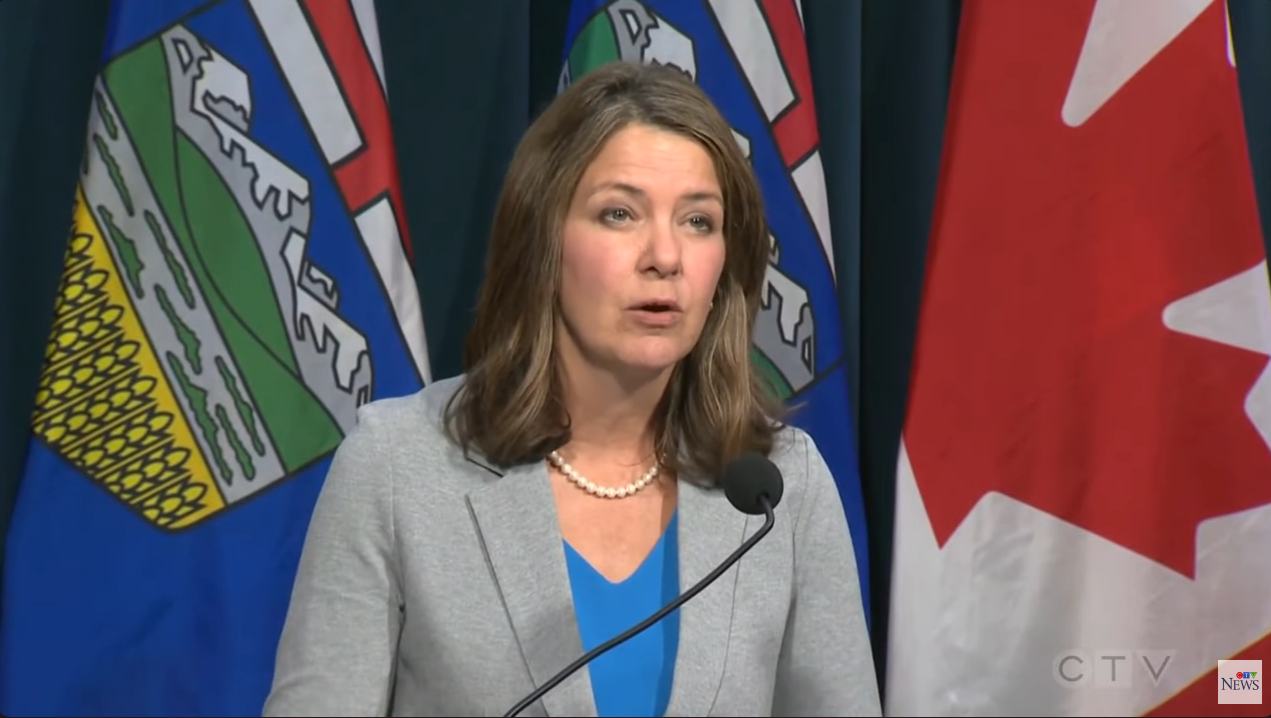
The leader of Canada’s province of Alberta announced a slate of new anti-LGBTQ policies in a video released on social media on Wednesday prompting outcry from queer activists who say the new policies will be the most restrictive on queer and transgender youth in Canada.
In a seven-minute video uploaded to X, Premier Danielle Smith announced that “top and bottom” surgeries would be restricted to those aged 18 and older, while trans youth under age 16 would no longer be able to access hormone therapies. Genital surgeries are already not generally medically recommended or performed on minors in Canada.
Trans students under 16 will need parental permission before using a name or pronoun different from their legal name in school, while students 16 and older will have their parents notified of any name and pronoun changes.
The premier says the province will also work to restrict women’s and girls’ sports to biological females, while also encouraging new coed leagues that trans students would be allowed to play in.
Additionally, under the new policy, parents will need to be notified and given the right to opt their children out before any classroom discussion on sexuality and gender, while “third party materials” on the sex, sexual orientation, and gender identity will need to be vetted by the Education Ministry before they can be used in class.
It’s unclear at this point how the new policies will be enacted or enforced, but Smith has said that she wants the policies to be in place by the fall. Alberta’s Child and Youth Advocate, an office of the legislature, was not briefed on the policy before it was announced.
In her video, Smith also announces that the government will attempt to recruit doctors who can perform gender-confirming surgeries to Alberta for adult care — currently, those seeking gender surgeries must travel to Quebec for care, nearly 2,000 miles away. Smith says that about 100 people receive gender-confirming surgeries annually, about a quarter of whom are aged 18-25.
Smith also announces that child protection laws will be strictly enforced to protect trans children from abusive parents.
However, in her follow up press conference today, Smith seemed to be unaware of what gender care involves, erroneously suggesting that people who undergo gender-affirming care cannot have sex or reproduce.
The Canadian LGBTQ advocacy group Egale and the Canadian Civil Liberties Union quickly announced that it would be filing a legal action against the policy.
“This is a direct and unprecedented attack on 2SLGBTQI+ Canadians, and trans and gender diverse youth in particular. The draconian measures announced run directly counter to expert guidance and evidence, violate the constitutional rights of 2SLGBTQI+ people, and will lead to irreparable harm and suffering,” Egale says in a statement. “The government of Alberta is playing politics with some of the most vulnerable members of our society: Trans and gender diverse youth, attacking them for cheap political points. We will not stand for it.”
The policies were also quickly denounced by Women and Sport Canada and the Alberta Teacher’s Association, the Alberta New Democratic Party and the mayor of Calgary.
Federal Cabinet ministers were also quick to denounce the policy, but cautioned that until the policy is actually brought forward, there isn’t anything for the government to take action against.
“As a parent, my heart breaks for young 2SLGBTQIA+ people in Alberta who are being targeted by @ABDanielleSmith’s harmful and misguided policy. To trans and gender diverse youth: Please know that we — and so many Canadians — stand with you and will stand up for your rights,” Justice Minister Arif Virani wrote on X.
Trans activist Fae Johnstone, founder of the advocacy group Queer Momentum, denounced the policy and called on allies and the federal government to do more to protect trans youth.
“Conservative premiers are bullying trans kids. This whole issue has cast aside the humanity of transgender young people. Kids deserve better than this. Trans young people deserve to grow up in safe and supportive environments,” Johnstone wrote on X.
Alberta’s new policies around trans youth and sexual orientation in schools are the most restrictive to be proposed in Canada but follow a growing trend among conservative-run provinces.
The policy around parental notification and consent surrounding name and pronoun use mirrors similar policies introduced in Saskatchewan and New Brunswick last year. The governments of Ontario and Quebec also announced similar policies would be forthcoming last year, but have not announced them yet.
When a judge blocked the Saskatchewan policy as likely unconstitutional, the Saskatchewan government passed a bill that allows the policy to override the Charter of Rights, using a constitutional procedure that has seen growing use by Canada’s right-wing provincial governments in recent years. Smith did not rule out using the “notwithstanding” clause to shield the policy from judicial review.
There’s little evidence that these policies are popular among the mainstream in Canada. Last year, Manitoba’s Progressive Conservative government lost an election after campaigning on introducing a “parents’ rights” policy around trans students. New Brunswick will go to the polls later this year.
In the northern Alberta town of Westlock, voters will weigh in on banning Pride flags on municipal property this month.
A hardcore base of anti-LGBTQ activists has grown in Canada in recent years, evolving out of the anti-vax and anti-lockdown movements, and it has been courted by conservative politicians. Smith welcomed these activists at the United Conservative Party of Alberta Convention last year, where they passed policy platforms calling for these policies.
Anti-trans activists also passed policy platforms at the federal Conservative Party convention last year calling for bans on trans people using women’s bathrooms and restricting gender-affirming care for trans youth.
Neither the federal Conservative Party nor its leader Pierre Poilievre have addressed the platform since it was passed. Smith has been explicitly courting the radical right for the last several years, recently appearing in public events across the province with disgraced former Fox News Host Tucker Carlson, disgraced transphobic former University of Toronto professor and current social media troll Jordan Peterson, and convicted fraudster and former owner of the right-wing National Post newspaper Conrad Black.
Black was pardoned by then-U.S. President Donald Trump in 2019.
Canada
Eight jailed across Canada during anti-LGBTQ sex ed rallies
Prime minister condemned bigotry; counterprotests outnumbered demonstrations
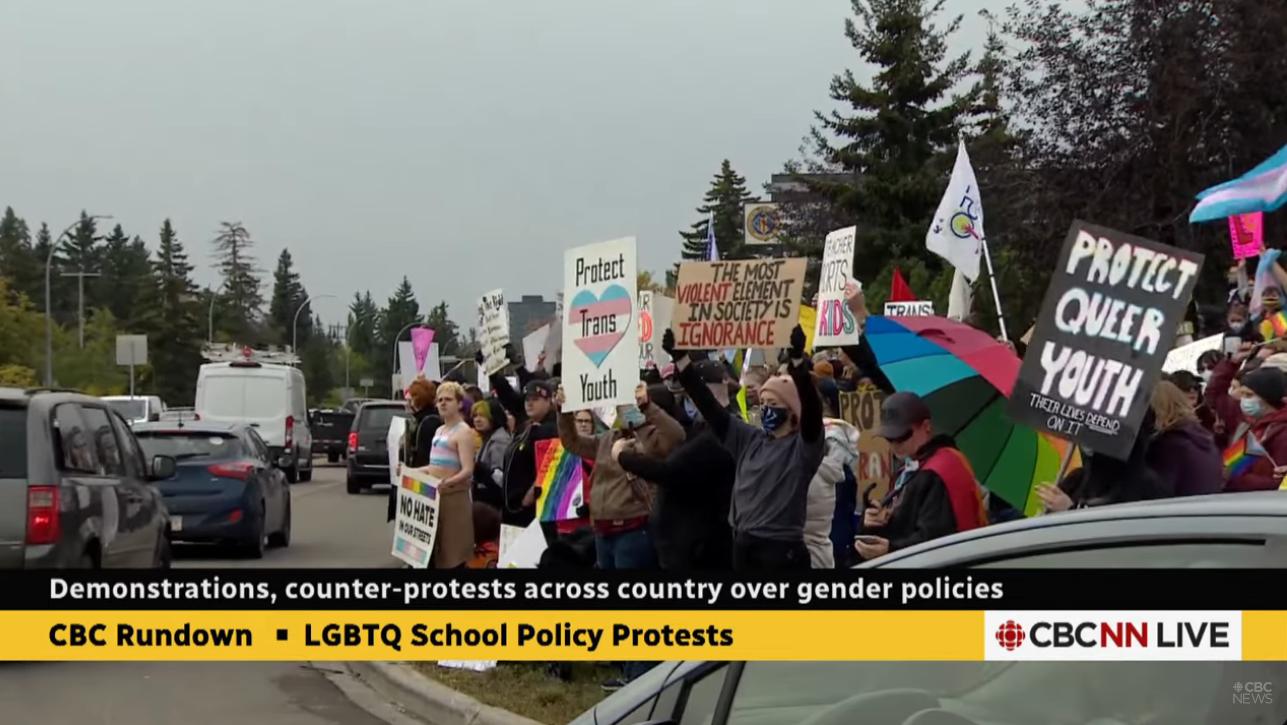
A highly coordinated series of anti-LGBTQ protests rocked more than 80 cities across Canada on Wednesday, in a significant escalation of tactics by Canada’s anti-LGBTQ extremists.
The coordinated protests dubbed 1 Million March 4 Children are demanding an end to discussions on sexual orientation and gender identity in Canadian classrooms. They come as several Canadian provinces have enacted policies that require students to have parental permission to change their preferred name or pronoun used in schools, and shortly after the federal Conservative Party adopted a series of anti-trans policies at its national convention.
According to its website, 1 Million March 4 Children is calling for “the elimination of the Sexual Orientation and Gender Identity (SOGI) curriculum, pronouns, gender ideology and mixed bathrooms in schools.” The website also lists among its supporters numerous groups that were opposed to masking policies during the COVID-19 pandemic, anti-vaccine groups, groups that promote conspiracy theories, and groups that support the truck convoys that laid siege to Ottawa and several U.S. border crossings last year.
Protests happened from coast to coast, in big cities, suburbs and small towns, but in most cases, they were met with coordinated counter-protests in support of LGBTQ rights who greatly outnumbered the protesters.
CBC reported that counter-protesters numbered roughly double the anti-LGBTQ protesters in St. John’s, Newfoundland.
Inclusive sex education has long been part of school curriculums in most provinces in Canada and has generally enjoyed support from all major political parties.
While the protests where mostly peaceful, at least four anti-LGBTQ protesters were arrested after getting into altercations with counter-protestors in British Columbia, and police advised that the protest in front of the provincial legislature had become “unsafe.”
Police in Nanaimo, British Columbia, tackled and arrested one man who attempted to flee after allegedly getting into a physical altercation at City Hall. Two protestors were also arrested in Victoria, British Columbia, as they demonstrated in front of the provincial legislature, and another protester was arrested in Vancouver. Police in both cities did not provide additional information.
Ottawa police also arrested two protesters for allegedly inciting hatred and another for causing a disturbance in at the protest in front of Parliament.
And Toronto police arrested 47-year-old protester Julia Stevenson for allegedly bringing a weapon to the demonstration outside the provincial legislature. Police did not give further details about what kind of weapon she is alleged to have been carrying.
Prime Minister Justin Trudeau, who was at the U.N. General Assembly in New York, condemned the anti-LGBTQ protests in a tweet on X, formerly Twitter.
“Let me make one thing very clear: Transphobia, homophobia and biphobia have no place in this country. We strongly condemn this hate and its manifestations, and we stand united in support of 2SLGBTQI+ Canadians across the country — you are valid and you are valued,” he wrote.
Conservative Party leader Pierre Poilievre did not put out any statement on the protests, nor did deputy leader Melissa Lantsman, who is openly lesbian and has previously spoken out on LGBTQ issues on behalf of the party.
The leader of the left-leaning New Democratic Party Jagmeet Singh joined the counter-protestors who demonstrated in Ottawa and marched toward Parliament Hill.
“We know that there’s a lot of folks that don’t feel safe because of the rise in hate and division that’s targeting vulnerable people,” Singh told CTV. “But then you see a lot of people coming together, and it shows the strength of solidarity, of us supporting each other, of having each other’s back.”
Alberta Teachers’ Association President Jason Schilling says the protesters are part of a North America-wide movement fomenting hatred against queer people using misinformation and lies.
“Using ‘parental consent’ as camouflage, this rally was part of a coordinated strike across North America to promote misinformation, intolerance and hate toward the 2SLGBTQIA+ community, as well as toward teachers who work to protect the safety and well-being of all students,” Schilling said in a statement.
In many cities, the anti-LGBTQ protests were officially condemned by mayors and school boards.
Toronto Mayor Olivia Chow, who has publicly supported LGBTQ rights since the 1980s, issued a strong statement condemning the protests.
“We stand against all forms of discrimination, hatred and bigotry, and for the safety and well-being of all young people. Some wish to target our schools and libraries to spread hate. We know these must be spaces that welcome everyone, especially students,” Chow wrote.
The city of Whitehorse, Yukon, issued a statement condemning bigotry in advance of the protests.
“While the city supports people’s right to organize and protest, we stand by our 2SLGBTQIA+ community members and their right to live their true selves safely and free of harassment and hate. The promotion of anti-2SLGBTQIA+ ideas has no place in our community and messages that target fellow community members will not be tolerated,” the statement says.
However, New Brunswick Primer Blaine Higgs, who was the first to introduce a “parental consent” policy for trans students, joined the protesters in front of the provincial legislature in Fredericton.
“I think our parents should become knowledgeable about what their kids are being taught and what is important for them to learn in schools and what’s important for parents to make decisions on with kids that are under 16-years-old,” Higgs told reporters.
British Columbia Conservative Party leader John Rustad went further in a statement on the protests. While he says he doesn’t “officially” support the protests, if his party wins next year’s election, he promised to cancel the province’s sex ed curriculum and implied he would ban transgender girls from sports.
-

 State Department4 days ago
State Department4 days agoState Department releases annual human rights report
-

 South America2 days ago
South America2 days agoArgentina government dismisses transgender public sector employees
-

 District of Columbia2 days ago
District of Columbia2 days agoCatching up with the asexuals and aromantics of D.C.
-

 Politics4 days ago
Politics4 days agoSmithsonian staff concerned about future of LGBTQ programming amid GOP scrutiny

